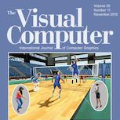Growth mixture modeling (GMM) is an analytical tool for identifying multiple unobserved sub-populations of longitudinal processes. In particular, it describes change patterns within each latent sub-population and examines between-individual differences in within-individual change for each sub-group. One research interest in utilizing GMMs is to explore how covariates affect such heterogeneity in change patterns. Liu and Perera (2022c) extended mixture-of-experts (MoE) models, which mainly focus on time-invariant covariates, for allowing the covariates to account for within-group and between-group differences simultaneously and examining the heterogeneity in nonlinear trajectories. The present study further extends Liu and Perera (2022c) and examines the effects on trajectory heterogeneity of time-varying covariates (TVCs). Specifically, we propose methods to decompose a TVC into a trait feature (e.g., the baseline value of the TVC) and a set of state features (e.g., interval-specific slopes or changes). The trait features are allowed to account for within-group differences in growth factors of trajectories (i.e., trait effect), and the state features are allowed to impact observed values of a longitudinal process (i.e., state effect). We examine the proposed models using a simulation study and a real-world data analysis. The simulation study demonstrated that the proposed models are capable of separating trajectories into several clusters and generally generating unbiased and accurate estimates with target coverage probabilities. With the proposed models, we showed the heterogeneity in the trait and state features of reading ability across latent classes of students' mathematics performance. Meanwhile, the trait and state effects on mathematics development of reading ability are also heterogeneous across the clusters of students.
翻译:增长混合模型( GMM ) 是一个分析工具,用于确定跨纵向进程的多个未观测到的子群。 特别是, 它描述每个潜在亚群内部的变化模式, 并检查每个亚群个人内部变化中的个体差异。 一个研究兴趣是探索共同变异如何影响变化模式中的这种异质性。 Liu 和 Perera (2022c) 扩展的专家混合模型(MOE) 主要侧重于时间变量, 允许同级变量同时计算小组内部和群体之间的差异, 并检查非线性轨迹中的个人变化差异。 本研究进一步扩展了Liu和 Perera (2022c), 并考察了对时间变化模式( TVC ) 轨迹变异性的影响。 我们提出了将TVC 转换成一个特性( 例如, TVC 的基线值) 的方法, 以及一组状态特征( 例如, 分级变异性变异性变异性变异性读数或变异性) 。 变异性的能力特征可以用来计算进化模型 。, 和变异性变异性变异性变变变变变变变变的模型 。, 。 变变变的变 变变变变变变变变的变 变 变变的变 变 变的变变变变变变 变 变 变 变 变变变变变变变变变变 变 变 变 变 变 变 变 变 变 变 变 变 变 变变变 变 变 变变 变 变 变 变 变 变变 变 变 变变变变变 变 变 变 变 变 变 变 变 变 变 变 变 变 变 变 变 变 变 变 变 变 变 变 变 变 变 变 变 变 变 变 变 变 变 变 变 变 变 变 变 变 变 变 变 变 变 变 变 变 变 变 变 变 变 变 变 变 变 变 变 变 变 变变变变



